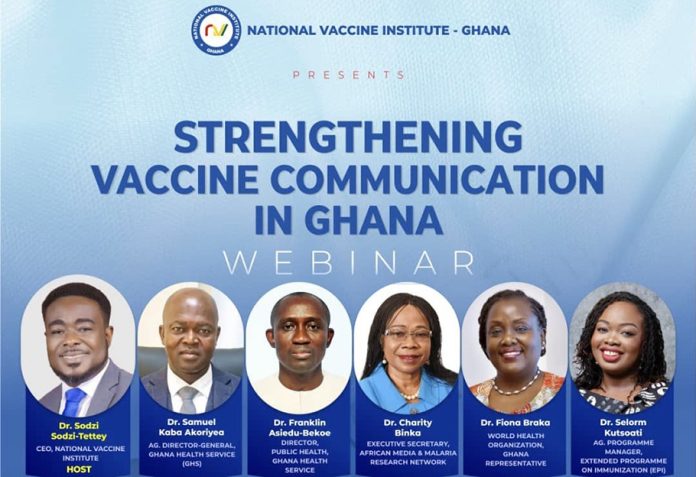In a concerted effort to debunk myths and rebuild public confidence in vaccines, the National Vaccine Institute (NVI) has called on journalists to take a frontline role in demystifying conspiracy theories surrounding vaccine uptake in Ghana.
At a webinar dubbed “Strengthening Vaccine Communication in Ghana”, the NVI, in collaboration with the Ghana Health Service (GHS) and the African Media and Malaria Research Network (AMMREN), engaged media professionals on the pivotal role of accurate and ethical journalism in improving vaccine confidence.
Dr. Sodzi Sodzi-Tettey, Acting Chief Executive Officer of the NVI, underscored the media’s influence in shaping public perception about vaccines.
He charged journalists to intensify public education and ensure that misinformation and disinformation do not derail Ghana’s hard-won gains in immunisation.
“Accurate, ethical and well-informed journalism is a cornerstone of public health,” Dr.Sodzi-Tettey said, adding “as you go through this training, I encourage you to engage deeply, challenge ideas and help shape a culture of trust and evidence-based communication in Ghana.”
He reassured Ghanaians that the NVI, in partnership with the Food and Drugs Authority (FDA) and international manufacturers, is committed to maintaining the highest safety and quality standards in vaccine production. He also highlighted the NVI’s ongoing efforts to strengthen technology transfer and build partnerships for local vaccine manufacturing.
The Impact of Immunization in Ghana
Since the introduction of the Expanded Programme on Immunization (EPI), Ghana has made remarkable progress in eliminating several vaccine-preventable diseases.
Neonatal tetanus was eliminated in 2011, and the country has recorded no cases of wild poliovirus since 2008.
Similarly, no measles-related deaths were reported between 2003 and 2021, while cases of pneumonia, diarrhoea, and meningitis have drastically declined.
These achievements have contributed to a sharp reduction in under-five mortality from 111 deaths per 1,000 live births in 2003 to just 40 per 1,000 in 2022, underscoring the transformative power of vaccines in safeguarding children’s lives.
Persistent Challenges in the Immunization Landscape
Despite these successes, Ghana’s immunization system still faces hurdles. The country remains heavily reliant on donor partners, particularly Gavi, the Vaccine Alliance, which is expected to phase out support by 2030.
Other challenges include frequent breakdowns in cold chain equipment, inequities in vaccine coverage among districts, and workforce fatigue due to repeated outbreak responses.
Compounding these operational issues are the persistent threats of anti-vaccine propaganda, misinformation, and vaccine hesitancy, especially among adults and certain religious or demographic groups.
Concerns about side effects, distrust in government systems, and the influence of social media rumours continue to undermine vaccine confidence.
Understanding the Drivers of Vaccine Hesitancy
Dr. Franklin Asiedu-Bekoe, Director of Public Health at the GHS shed light on the behavioural and social factors influencing vaccine uptake in Ghana. He explained that convenience, complacency, and confidence are the three major drivers of vaccine hesitancy.
According to him, many people perceive getting vaccinated as time-consuming, which discourages participation. He added that individuals who recognise the risk of infection within their social circles are more likely to seek vaccination, a behavioural insight that can inform future public health messaging.
“Those who believe in a vaccine’s safety and efficacy are more likely to get vaccinated,” Dr. Asiedu-Bekoe said, stressing the importance of sustained communication to build trust and counter misinformation.
He called for the strengthening of the National Misinformation Taskforce to monitor and respond to rumours, enhance collaboration with the FDA to manage adverse events transparently, and intensify community engagement using trusted local voices and influencers.
Dr. Asiedu-Bekoe emphasised that improving vaccine confidence requires targeted communication, prompt responses to public concerns, and increased investment in Ghana’s health infrastructure to support consistent vaccine delivery.
The Media as Vaccine Champions
Dr. Charity Binka, Executive Director of AMMREN, emphasised that journalists have a unique power to shape public opinion and build trust through factual storytelling.
“We cannot deny that vaccines are among the most effective public health interventions in human history,” she said, adding“But their power can only be realised when people trust and accept them.”
She lamented the growing wave of misinformation that has led to resistance to recent campaigns, such as the HPV vaccination drive, and called for continued training of journalists to report accurately on vaccine issues.
Dr.Binka further called for Ghana to accelerate efforts toward local vaccine production, arguing that the COVID-19 pandemic exposed the dangers of overreliance on foreign supply chains.
“Local vaccine production is not just an economic issue—it’s a matter of survival, sovereignty, and resilience,” she said.
“It will ensure timely access, create jobs, build scientific expertise and position Ghana as a leader in health innovation in West Africa.”
Building Vaccine Confidence and Trust
Experts at the webinar agreed that restoring public confidence in vaccines requires a multi-pronged approach strengthening the National Misinformation Taskforce, enhancing community engagement and promoting collaboration between the FDA, media and local influencers.
Journalists were urged to use both traditional and social media platforms to counter myths and rumours, share science-based information, and highlight human stories that showcase the life-saving impact of immunization.
For more news, join The Chronicle Newspaper channel on WhatsApp: https://whatsapp.com/channel/0029VbBSs55E50UqNPvSOm2z









